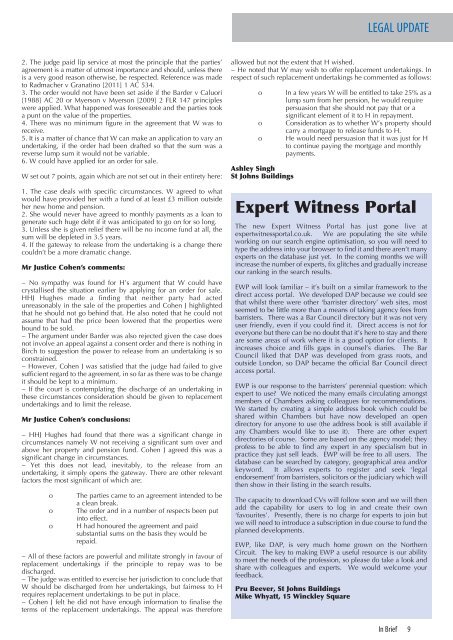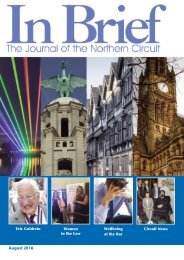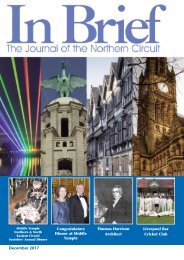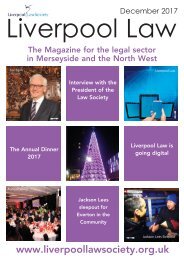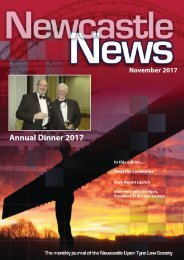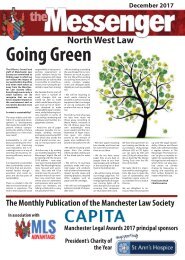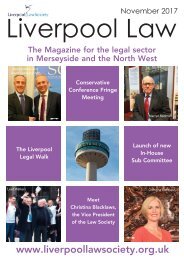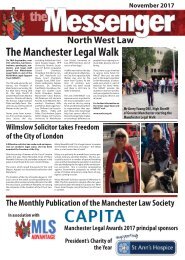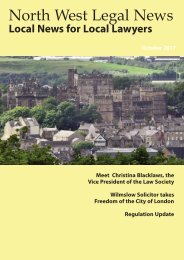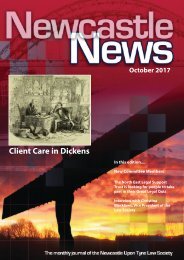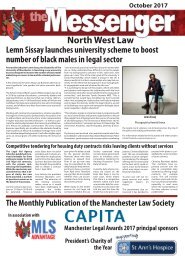IB April 2018
You also want an ePaper? Increase the reach of your titles
YUMPU automatically turns print PDFs into web optimized ePapers that Google loves.
LEGAL UPDATE<br />
2. The judge paid lip service at most the principle that the parties’<br />
agreement is a matter of utmost importance and should, unless there<br />
is a very good reason otherwise, be respected. Reference was made<br />
to Radmacher v Granatino [2011] 1 AC 534.<br />
3. The order would not have been set aside if the Barder v Caluori<br />
[1988] AC 20 or Myerson v Myerson [2009] 2 FLR 147 principles<br />
were applied. What happened was foreseeable and the parties took<br />
a punt on the value of the properties.<br />
4. There was no minimum figure in the agreement that W was to<br />
receive.<br />
5. It is a matter of chance that W can make an application to vary an<br />
undertaking, if the order had been drafted so that the sum was a<br />
reverse lump sum it would not be variable.<br />
6. W could have applied for an order for sale.<br />
W set out 7 points, again which are not set out in their entirety here:<br />
1. The case deals with specific circumstances. W agreed to what<br />
would have provided her with a fund of at least £3 million outside<br />
her new home and pension.<br />
2. She would never have agreed to monthly payments as a loan to<br />
generate such huge debt if it was anticipated to go on for so long.<br />
3. Unless she is given relief there will be no income fund at all, the<br />
sum will be depleted in 3.5 years.<br />
4. If the gateway to release from the undertaking is a change there<br />
couldn’t be a more dramatic change.<br />
Mr Justice Cohen’s comments:<br />
− No sympathy was found for H’s argument that W could have<br />
crystallised the situation earlier by applying for an order for sale.<br />
HHJ Hughes made a finding that neither party had acted<br />
unreasonably in the sale of the properties and Cohen J highlighted<br />
that he should not go behind that. He also noted that he could not<br />
assume that had the price been lowered that the properties were<br />
bound to be sold.<br />
− The argument under Barder was also rejected given the case does<br />
not involve an appeal against a consent order and there is nothing in<br />
Birch to suggestion the power to release from an undertaking is so<br />
constrained.<br />
− However, Cohen J was satisfied that the judge had failed to give<br />
sufficient regard to the agreement, in so far as there was to be change<br />
it should be kept to a minimum.<br />
− If the court is contemplating the discharge of an undertaking in<br />
these circumstances consideration should be given to replacement<br />
undertakings and to limit the release.<br />
Mr Justice Cohen’s conclusions:<br />
− HHJ Hughes had found that there was a significant change in<br />
circumstances namely W not receiving a significant sum over and<br />
above her property and pension fund. Cohen J agreed this was a<br />
significant change in circumstances.<br />
− Yet this does not lead, inevitably, to the release from an<br />
undertaking, it simply opens the gateway. There are other relevant<br />
factors the most significant of which are:<br />
o<br />
o<br />
o<br />
The parties came to an agreement intended to be<br />
a clean break.<br />
The order and in a number of respects been put<br />
into effect.<br />
H had honoured the agreement and paid<br />
substantial sums on the basis they would be<br />
repaid.<br />
− All of these factors are powerful and militate strongly in favour of<br />
replacement undertakings if the principle to repay was to be<br />
discharged.<br />
− The judge was entitled to exercise her jurisdiction to conclude that<br />
W should be discharged from her undertakings, but fairness to H<br />
requires replacement undertakings to be put in place.<br />
− Cohen J felt he did not have enough information to finalise the<br />
terms of the replacement undertakings. The appeal was therefore<br />
allowed but not the extent that H wished.<br />
− He noted that W may wish to offer replacement undertakings. In<br />
respect of such replacement undertakings he commented as follows:<br />
o<br />
o<br />
o<br />
Ashley Singh<br />
St Johns Buildings<br />
In a few years W will be entitled to take 25% as a<br />
lump sum from her pension, he would require<br />
persuasion that she should not pay that or a<br />
significant element of it to H in repayment.<br />
Consideration as to whether W’s property should<br />
carry a mortgage to release funds to H.<br />
He would need persuasion that it was just for H<br />
to continue paying the mortgage and monthly<br />
payments.<br />
Expert Witness Portal<br />
The new Expert Witness Portal has just gone live at<br />
expertwitnessportal.co.uk. We are populating the site while<br />
working on our search engine optimisation, so you will need to<br />
type the address into your browser to find it and there aren’t many<br />
experts on the database just yet. In the coming months we will<br />
increase the number of experts, fix glitches and gradually increase<br />
our ranking in the search results.<br />
EWP will look familiar – it’s built on a similar framework to the<br />
direct access portal. We developed DAP because we could see<br />
that whilst there were other ‘barrister directory’ web sites, most<br />
seemed to be little more than a means of taking agency fees from<br />
barristers. There was a Bar Council directory but it was not very<br />
user friendly, even if you could find it. Direct access is not for<br />
everyone but there can be no doubt that it’s here to stay and there<br />
are some areas of work where it is a good option for clients. It<br />
increases choice and fills gaps in counsel’s diaries. The Bar<br />
Council liked that DAP was developed from grass roots, and<br />
outside London, so DAP became the official Bar Council direct<br />
access portal.<br />
EWP is our response to the barristers’ perennial question: which<br />
expert to use? We noticed the many emails circulating amongst<br />
members of Chambers asking colleagues for recommendations.<br />
We started by creating a simple address book which could be<br />
shared within Chambers but have now developed an open<br />
directory for anyone to use (the address book is still available if<br />
any Chambers would like to use it). There are other expert<br />
directories of course. Some are based on the agency model; they<br />
profess to be able to find any expert in any specialism but in<br />
practice they just sell leads. EWP will be free to all users. The<br />
database can be searched by category, geographical area and/or<br />
keyword. It allows experts to register and seek ‘legal<br />
endorsement’ from barristers, solicitors or the judiciary which will<br />
then show in their listing in the search results.<br />
The capacity to download CVs will follow soon and we will then<br />
add the capability for users to log in and create their own<br />
‘favourites’. Presently, there is no charge for experts to join but<br />
we will need to introduce a subscription in due course to fund the<br />
planned developments.<br />
EWP, like DAP, is very much home grown on the Northern<br />
Circuit. The key to making EWP a useful resource is our ability<br />
to meet the needs of the profession, so please do take a look and<br />
share with colleagues and experts. We would welcome your<br />
feedback.<br />
Pru Beever, St Johns Buildings<br />
Mike Whyatt, 15 Winckley Square<br />
In Brief 9


